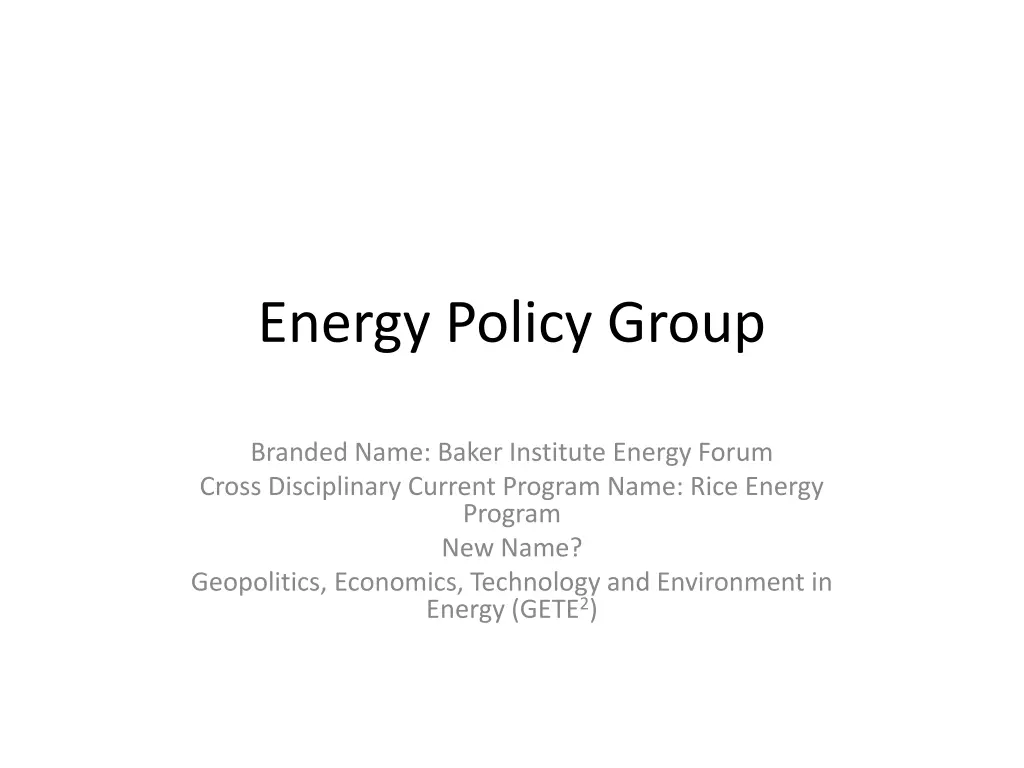
Energy Policy and Geopolitics: GETE2 Program Overview
Explore the Baker Institute Energy Forum's cross-disciplinary Rice Energy Program, now known as GETE2, focusing on geopolitics, economics, technology, and the environment in energy. Delve into current areas of focus, new initiatives, energy and water nexus considerations, and modeling efforts in this comprehensive energy study.
Download Presentation

Please find below an Image/Link to download the presentation.
The content on the website is provided AS IS for your information and personal use only. It may not be sold, licensed, or shared on other websites without obtaining consent from the author. If you encounter any issues during the download, it is possible that the publisher has removed the file from their server.
You are allowed to download the files provided on this website for personal or commercial use, subject to the condition that they are used lawfully. All files are the property of their respective owners.
The content on the website is provided AS IS for your information and personal use only. It may not be sold, licensed, or shared on other websites without obtaining consent from the author.
E N D
Presentation Transcript
Energy Policy Group Branded Name: Baker Institute Energy Forum Cross Disciplinary Current Program Name: Rice Energy Program New Name? Geopolitics, Economics, Technology and Environment in Energy (GETE2)
Current areas of Focus Geopolitics of energy Business cycles, Financial markets and energy Economic growth and energy demand including R&D in renewables and its impact on economic growth (including output subsidies vs R&D funding) Environmental impacts of energy use US energy policy Technological impacts on the energy markets including renewables , energy efficiency, CCS and unconventional oil and gas Institutional and regulatory impacts on energy markets (including national oil companies/privatization, electricity markets, emissions trading) International trade in energy commodities Competition between energy sources (and how energy choices impact air, water, climate); Energy transitions Cross disciplinary energy modeling and environmental modeling for market forecasting, pollution forecasting and policy scenarios analysis Political, social, cultural ,religious impacts on energy markets: for example, Arab spring, resource nationalism in Latin America, resource curse issues (Africa)
New Initiatives Linking energy modeling efforts across CEVE, Kennedy Institute, Applied Math, Statistics, and Baker-Economics-Poli Sci Policy, Economic, Social context of technological breakthroughs Expand work on energy choices roadmap Expanding work on environmental impacts of energy choices including mitigation strategies Establish premier modeling capabilities in studying the energy-water nexus (like our joint biofuels study) more detail next slide Establish premier modeling capabilities in methane hydrates Expanding energy modeling efforts in international relations, history and cultural case studies Solidifying existing nascent curricula and internships in energy education
Thoughts on Energy and Water Nexus Modeling of Heavy oil development potential in US and Canada and water use related issues Water and Shale gas and oil production Groundwater safety and energy choices Expand work on biofuels and water Cost of water desalination and purification through electricity breakthroughs
Why Now at Rice? Better leverage premier position in energy policy research Energy industry in Houston increasingly seeking our assistance in policy analysis Oil companies have eliminated capacities in energy forecasting and modeling and are outsourcing and interesting in Rice providing more support Energy companies increasingly seeking geopolitical analysis to respond to severe political changes internationally Energy companies seeking Rice job candidates with broad curricular background that includes combination of S &E, economic/finance and policy/geopolitical assessment skills Capitalize on S&E capabilities at Rice to expand economic and policy analysis US at crossroads with opportunities from unconventional oil and gas but environmental challenges Large funding opportunities for this subject
Why Rice (for Energy Policy) Established connections with leading CEOs, chief economic and policy VPs of major energy firms, and foreign oil producing governments and NOCs Premier position nationally in economic modeling of fossil fuels markets Established high rank (career prizes, publishing, high international ranking) in energy economics and policy High visibility and brand in geopolitics of energy
